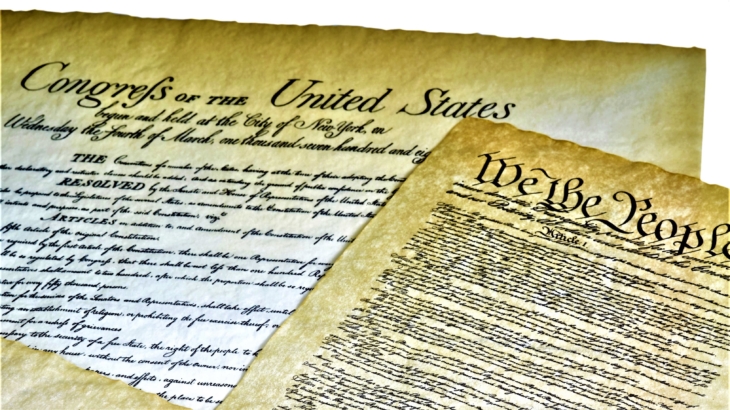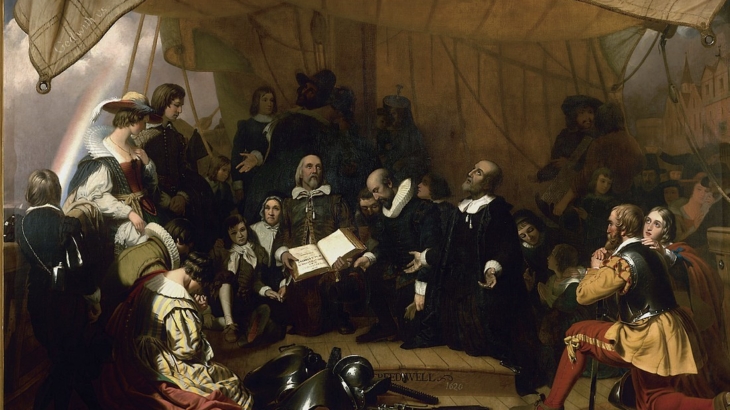American government, as President George Washington notes, is to be based on opportunities to discuss political and policy issues by reflection and choice rather than by accident and force:
[I]f Men are to be precluded from offering their Sentiments on a matter, which may involve the most serious and alarming consequences, that can invite the consideration of Mankind, reason is of no use to us; the freedom of Speech may be taken away, and, dumb and silent we may be led like sheep, to the Slaughter. – George Washington, Speech to the Officers of the Army at Newburgh, the Newburgh Address, March 15, 1783.
The Articles of Confederation Congress had difficulty with the states meeting their funding requisitions during most of the Revolutionary War period. Ending the siege at Yorktown in General George Washington’s favor only made matters worse. With the British no longer posing a threat, the men of the Continental Army were ordered into bivouac at Newburgh, New York. Soon thereafter, Congress stopped paying them, as a “cost-saving” measure, and also stopped funding the soldiers’ pensions.
The conflict over this came to a head when an anonymous letter was circulated in Congress in which a threat was made: the Army would remove itself to “unsettled” western lands, leaving the states unprotected until such time as pay and funding resumed.
Commander-in-Chief General George Washington traveled personally to Newburgh, and in an emotional scene during which he apologized for having to use spectacles to read his prepared remarks said, “I have grown not only gray, but almost blind in the service of my country,” he convinced the officers and men to renew their trust in Congress. Washington noted that the anonymous letter was appropriate since, “[I]f Men are to be precluded from offering their Sentiments on a matter, … the freedom of Speech may be taken away, and, dumb and silent we may be led like sheep, to the Slaughter.”
“The Founders considered freedom of speech a fundamental natural right.”[i] At the same time, the right was also understood to not be absolute because during the early colonial period, “seditious words” were taken seriously and often prosecuted, as was blasphemy in most states.
When Patrick Henry proclaimed on May 29, 1765, that “Caesar had his Brutus, Charles the First his Cromwell and George the Third … may profit by their example,” he was indeed guilty of treason under English law. To “compass or imagine” the death of the King was one of the several crimes in the Treason Act of 1351, and Henry knew this. To the cries of “Treason” from some of the Burgesses in the room, Henry replied, “If this be treason, make the most of it.”
Christian thinker, G. K. Chesterton, said: “To have a right to do a thing is not at all the same as to be right in doing it.”[ii]
Sir William Blackstone agreed: “Every freeman has an undoubted right to lay what sentiments he pleases before the public…But if he publishes what is improper, mischievous, or illegal, he must take the consequence of his temerity.”[iii] Note that Blackstone refers here to “illegal” speech; the Treason Act would provide but one example.
But other founding era philosophers disagreed. French philosopher Baron de Montesquieu,[iv] in his acclaimed work, The Spirit of the Laws, wrote: “The laws do not take upon them to punish any other than overt acts. . . . Words do not constitute an overt act; they remain only an idea.”
Without freedom of speech during the period 1760-1776, there likely would have been no revolution leading to American independence. Based on the Founder’s experience, the British would have prohibited public speeches arousing the people to claim their freedom and the press would have been severely curtailed.
“Freedom of speech is a principal pillar of a free government; when this support is taken away, the constitution of a free society is dissolved, and tyranny is erected on its ruins. Republics and limited monarchies derive their strength and vigor from a popular examination into the action of the magistrates. An evil magistrate entrusted with power to punish for words, would be armed with a weapon the most destructive and terrible.”[v]
In ratifying the United States Constitution, Virginia, North Carolina and Rhode Island (both of which copied Virginia’s submission verbatim) all proposed a free speech amendment and James Madison included an amendment, which read: “That the people have a right to freedom of speech, and of writing and publishing their sentiments; that the freedom of the press is one of the greatest bulwarks of liberty, and ought not to be violated.”[vi] In successive House and Senate committees this was “wordsmithed” to the wording eventually placed within the Bill of Rights of the United States Constitution.
The Founders great emphasis on freedom of speech makes the Alien and Sedition Acts of 1798 difficult to explain. Perhaps the expression “when the shoe is on the other foot” best captures Congress’s motivation to censor and suppress speech as the infant nation of America attempted to stay neutral in the on-again, off-again war between England and France. Americans were equally split on the question of which country the John Adams administration should support (even as both England AND France were both interdicting American shipping heading for their enemy’s ports). The Sedition Act made it illegal to make false or malicious statements about the Adams administration, specifically mentioning the President while conspicuously not mentioning the Vice-President. Criticism of Thomas Jefferson was therefore fair game, and certain “Adams-friendly” newspapers took great advantage of it.
So convinced they were of the unconstitutionality of the Acts, Thomas Jefferson and James Madison consented to drafting, respectively, the Kentucky and Virginia resolutions. These essays argued that the states have both a right and a moral responsibility to declare unconstitutional acts of the national government to be so and hold them to be null and void within their state.
The U.S. Supreme Court eventually found the Sedition Act to be constitutional in United States v. Thomas Cooper (1800).[vii] Congress had set the Alien and Sedition Acts to expire on March 3, 1801; the reason being was, the following day, a new President and Vice President would be inaugurated. Over a century later, President Woodrow Wilson’s administration would bring back the Alien and Sedition Laws (as the Espionage and Sedition Acts) as the U.S. entered World War I.
The Free Speech landscape had changed drastically by 1925 when the Court “incorporated” the Free Speech Clause into the Due Process Clause of the Fourteenth Amendment in Gitlow v. New York,[viii] creating an explosion of free speech cases based on state government actions, which continued thereafter.
Although the Free Speech Clause was intended to only restrict government actions, in the 1970s, the Supreme Court began deciding that commercial “speech” could also be regulated to some extent.[ix] Since that time, regulations on commercial advertising have become commonplace.
Eventually, the Court decided that certain types of “symbolic speech,” i.e. “speaking” through actions rather than words, should also be protected.[x] Over the years, the following are some examples of types of symbolic speech among those requiring protection:
- Wearing of black armbands (Tinker v. Des Moines Independent Community School District,1969)
- Flag-burning (Texas v. Johnson, 1989)
- Burning a Cross (R.A.V. v. City of St. Paul, 1992)
- Political campaign contributions (Citizens United, 2010)
Without freedom of speech, remaining steadfast to the principle of free civil discourse and public debate without censorship, America would likely be a very different place. “Freedom of Speech is the great Bulwark of Liberty; they prosper and die together.”[xi]
 Gary Porter is Executive Director of the Constitution Leadership Initiative (CLI), a project to promote a better understanding of the U.S. Constitution by the American people. CLI provides seminars on the Constitution, including one for young people utilizing “Our Constitution Rocks” as the text. Gary presents talks on various Constitutional topics, writes periodic essays published on several different websites, and appears in period costume as James Madison, explaining to public and private school students “his” (i.e., Madison’s) role in the creation of the Bill of Rights and the Constitution. Gary can be reached at gary@constitutionleadership.org, on Facebook or Twitter @constitutionled.
Gary Porter is Executive Director of the Constitution Leadership Initiative (CLI), a project to promote a better understanding of the U.S. Constitution by the American people. CLI provides seminars on the Constitution, including one for young people utilizing “Our Constitution Rocks” as the text. Gary presents talks on various Constitutional topics, writes periodic essays published on several different websites, and appears in period costume as James Madison, explaining to public and private school students “his” (i.e., Madison’s) role in the creation of the Bill of Rights and the Constitution. Gary can be reached at gary@constitutionleadership.org, on Facebook or Twitter @constitutionled.
[i] Robert Natelson, The Original Constitution; What it Actually Said and Meant.”Apis Books Colorado Springs, CO, p. 212.
[ii] https://en.wikipedia.org/wiki/G._K._Chesterton
[iii] William Blackstone, Commentaries on the Laws of England, 1769.
[iv] Montesquieu was the most oft-quoted political philosopher at the Constitutional Convention, after the Bible.
[v] Benjamin Franklin, On Freedom of Speech and the Press, Pennsylvania Gazette (17 November 1737).
[vi] https://en.wikipedia.org/wiki/United_States_Bill_of_Rights
[vii] https://www.archives.gov/education/lessons/sedition-case
[viii] https://www.law.cornell.edu/supremecourt/text/268/652
[ix] https://constitution.findlaw.com/amendment1/freedom-of-speech-for-corporations.html
[x] https://mtsu.edu/first-amendment/article/1022/symbolic-speech
[xi] Trenchard and Gordon, Cato’s Letters, February 4, 1720.
Click here for First Principles of the American Founding 90-Day Study Schedule.
Click here to receive our Daily 90-Day Study Essay emailed directly to your inbox.


 https://en.wikipedia.org/wiki/Mayflower#/media/File:Embarkation_of_the_Pilgrims.jpg
https://en.wikipedia.org/wiki/Mayflower#/media/File:Embarkation_of_the_Pilgrims.jpg